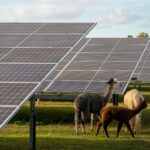You’ve probably heard it many times: if a deal sounds too good to be true, it probably is. When some landowners first see what they can earn on a solar project, they’re skeptical. They’re surprised to learn that they can earn three, four, sometimes ten times what they’re earning on an agricultural lease or by farming their land. We’re answering the number one question on many landowners’ minds: Is solar farming too good to be true?
Simple Economics
With the exception of a few crops, most agricultural landowners find that their revenue per acre can increase dramatically with a solar project. It’s a matter of simple economics. The cost of solar panel materials and supplies has come down by about 90 percent over the past decade, making solar projects more attractive and profitable for developers. That means more competition for viable sites, and that’s good news for landowners.
Solar development agreements are lucrative for landowners; the tradeoff is the length of the agreement. Solar projects usually last 30 – 40 years, so the landowner commits to the agreed-upon revenue for that entire time.
It’s possible that markets could change and make a specific crop more profitable. But it’s also very possible that weather, disasters, or negative market or policy changes would make crops fail or fail to yield profit. Farming is hard work and unpredictable. A solar project is a way to diversify your land investment (reducing risk) and to guarantee a predictable stream of income over several decades. Most landowners find that a solar agreement makes good economic sense.
Owner's Rights
Landowners receive revenue even during the due diligence and construction period, which can last several years. The landowner retains the right to harvest any crops on the acreage up to the point construction begins, and the developer will pay market price for any crops that can’t be harvested if the timeline changes. The landowner also retains the right to sell the property at any time; the developer’s contract would remain in place with the new owner.
Farmer's Status
Farmers are sometimes concerned about losing their identity as farmers, but that’s not the case. They’re usually committing just a portion of their property, leaving the rest available for traditional crops or other uses. And of course, solar farming is still farming – you’re just farming the sun.
When the project is decommissioned, the landowner can resume whatever activity the land was being used for. Or it’s possible that the solar infrastructure that has been established will be an asset in negotiating with another developer after the current project ends.
Here's Where We Come In
At Scout Land Consultants, our job in site acquisition is to make sure a landowner has all the information they need to make an informed decision on whether solar development makes sense for their property. We’re careful to outline all the economic benefits, along with the commitment and the pros and cons of the deal. Complete transparency is in everyone’s best interest.
Farmers are part of an essential national supply chain. That doesn’t change if you become part of the energy supply chain. Energy is essential to the economy, and landowners are rewarded for adding it to their holdings.
If you’d like to learn whether your land might be suitable for a solar project, take our complimentary solar quiz!






